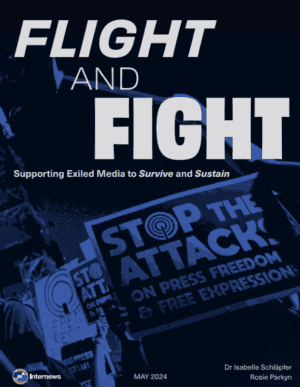Read the Report
Exiled media outlets provide crucial independent news and information to audiences in repressive environments that might otherwise lack this access.
Internews’ new report documents the issues exiled media face and how governments, donors, and others can support these outlets to continue their vital work. The report, Flight and Fight: Supporting Exiled Media to Survive and Sustain is based on interviews with 25 exiled media outlets from 17 countries, including Cuba, Syria, Sudan, Russia, and China.
“Exile media are so important – they are one of the few providers of accurate, independent information to citizens in authoritarian states,” said Dr. Isabelle Schlapfer, Research Manager at Internews and author of the report. “They can play a crucial role in providing an alternative to regime narratives and disinformation and holding governments and institutions accountable.”
The new research found that exiled outlets face many similar challenges, including:
- Getting caught up in sanctions and visa restrictions host countries impose on countries of origin.
- Recruiting skilled journalists, either in exile or still in the country-of-origin, and ensuring those journalists can report safely.
- Hesitation among potential host-country funders of stirring controversy by supporting journalists from “blacklisted” countries.
- Trouble reaching audiences in countries of origin from government-imposed internet shutdowns.
- Continued censorship attempts from origin-country governments, including DOS attacks, social media defamation and other forms of transnational harassment.
- Problematic content moderation by social media platforms that limits the visibility of media reporting.
- Finding successful business models when revenue from home-country markets is closed off.
Key findings from the report include:
- Many outlets operate in a hybrid model, with the most common mode as outlets operating with editor(s) outside of the country, and reporters both in and out of the country (76%).
- Revenue of almost all the outlets is philanthropic or nonexistent: 8% operate entirely without revenue; 28% are fully grant funded; 64% are funded by a combination of grants and business revenue.
- Registration hurdles in host countries prevent many outlets from registering as media organizations, with most registered as NGOs (56%).
The report recommends creating more networking opportunities for exile media to build solidarity and share resources; making flexible funding available to keep outlets operating; and providing more legal assistance for registration and visa requirements in host countries.
“Exile is rarely temporary, so outlets must establish ways to adapt and sustain operations from afar,” said Dr Schlapfer. “We are calling for more flexible funding from donors as these outlets simply wouldn’t exist without it.”
